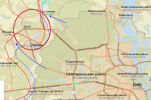Instead of waiting for this all-too-plausible scenario to unfold, the United States and its NATO allies and EU partners should act more forcefully now. Here’s one initiative that could make a difference: a U.S.-led coalition of willing NATO allies and EU partners should establish a protected air corridor and airlift humanitarian supplies to Lviv in western Ukraine.
The White House and NATO leaders have ruled out the possibility of a broad no-fly zone over Ukraine, to avoid the risk of direct combat between Russia and the western alliance, and we understand their concerns. However, a focused, strategically designed, protected humanitarian air corridor could deliver desperately needed relief to Ukrainians, including food, water, medical aid, and other humanitarian supplies. This operation would have limited objectives, geographic scope, and rules of engagement. Given the urgency, a coalition would begin operations as soon as possible and move toward full NATO and EU control as consensus builds.
There is precedent for such a measure. When Russian forces invaded Georgia in August 2008, the United States waited until a ceasefire had been declared, then
established an airlift into Tbilisi. Between Aug. 13 and Sept. 4, U.S. cargo planes and Navy warships delivered more than $30 million in emergency aid, including 1,200 tons of food and relief supplies such as tents. While the George W. Bush administration received criticism for not doing more to prevent the invasion,
some observers think the subsequent humanitarian effort deterred Russian forces from taking over the entire country of Georgia, including Tbilisi itself. President Bush’s national security advisor, Stephen Hadley,
said at the time, “We thought it was a useful signal to use military aircraft to transfer supplies and things into Georgia, and that was not lost on the Russians.” Additionally,
according to History.com author Sarah Pruitt, "Georgia turned further away from Russian influence in the aftermath of the conflict, and signed an association agreement with the EU in 2014.” The humanitarian effort may have saved the country.
A similar effort for Ukraine could be beneficial. It would, of course, have to be at the invitation of the sovereign government of Ukraine. The parameters for such an operation would be less bellicose than an open-ended no-fly zone. The coalition would inform Russia of its intention to send humanitarian aid into Lviv via cargo aircraft protected by escort aircraft. The United States could activate the
Civilian Air Reserve Fleet to reinforce the humanitarian nature of the effort, and seek to not only minimize tensions and hostility to U.S. and NATO military aircraft but also avoid costly or escalatory mistakes. Another option would be to undertake this airlift in partnership with, or under the auspices of, the United Nations High Commission on Refugees.




 jonka vuoksi voinkin kerrata päivitetyn ennusteeni sodan lopputulemasta:
jonka vuoksi voinkin kerrata päivitetyn ennusteeni sodan lopputulemasta:




 Motti!
Motti! 
